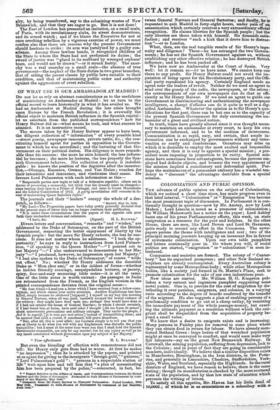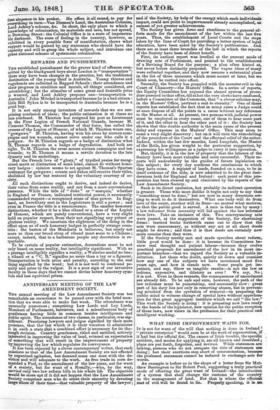COLONIZATION AND PUBLIC OPINION.
THE advance of public opinion on the subject of Colonization, which we noticed a short time since, has made progress even in. that brief interval. "Colonization" or " Emigration " has become the most prominent topic of discussion. In Parliament it, is con- tinually brought in question—now by Mr. Anstey, now by Lord Mahon ; Lord Lincoln is noted as a promoter of colonization ; Sir William Molesworth has a notice on the paper; Lord Ashley bases one of his great Parliamentary efforts, this week, on state emigration as a resource for the poor and helpless. In the other House, there are men, like Lord Devon and Lord St. Germans, quite ready to second any effort in the Commons. The news- papers pursue the theme with intelligence and zeal ; two of the principal morning journals keeping up an incessant fire in favour of systematic colonization. Upon our own table pamphlets and letters continually pour in. Go where you will, if social politics are started, " emigration " or " colonization " is soon in- troduced.
Companies and societies are formed. The colony of " Canter- bury" has its organized promoters ; and other New Zealand en- terprises are already contemplated. Every Australian colony is represented by some Metropolitan body ; while other Metropolitan bodies, like a society just formed in St. Martin's Place, seek to promote colonization for the sake of our own industrious poor. New ideas are started. Mr. William H. G. Kingston pub- lishes a very earnest and ingenious pamphlet suggesting some novel points. One is, to provide for the cost of migration by dis- tributing it over parishes, emigrants, and colonies, in a varying ratio according to the degree of benefit conferred by the transfer of the migrant. He also suggests a plan of enabling persons of a gentlemanly condition to go out at a cheap outlay, by remitting the immediate payment of the whole passage-money, but exact- ing the ultimate payment as a condition without which the emi- grant shall be disqualified from the acquisition of property bee yond a small value. We know that a desire to emigrate exists and is increasing. Many persons in Paisley pine for removal to some place where they can obtain food in return for labour. We have already men- tioned Bethnal Green : large bodies of that wretched population might at once be conveyed to comfort, and would soon make very fair labourers—say on the great New Brunswick Railway. In Cornwall, the mining population, suffering from depression, look to the Colonies ; and in point of fact they are going in considerable numbers, individually. We believe that a similar disposition exists in Manchester, Birmingham, in the Iron districts, in the Potte- ries, and generally in Lancashire, Cheshire, Staffordshire, York- shire, Wales, and Scotland, especially the Highlands. In the rural districts of England, we have reason to believe, there is the same feeling; though its manifestation is checked by the more scattered state of the population, and by that low state of education which prevents the writing of letters. To satisfy- all this appetite, Mr. Hawes has his little fund of 10,0001.; of which he is as ostentatious as a schoolboy with a first sixpence in his pocket. He offers it all round, to pay for
eiythmg in turn—'Van Diemen's Land, the Australian Colonies, Lora Ashley's scheme, (Ste. In short, the only place to which a knowledge of colonization, its materials and uses, has not spread, is Downing Street : the Colonial Office is in a state of impenetra- ble darkness. The state of feeling in the country, however, as exhibited in every possible form of manifestation, shows what support would be gained by any statesman who should have the capacity and will to grasp the whole subject, and introduce one gnat national scheme of systematic colonization.



























 Previous page
Previous page